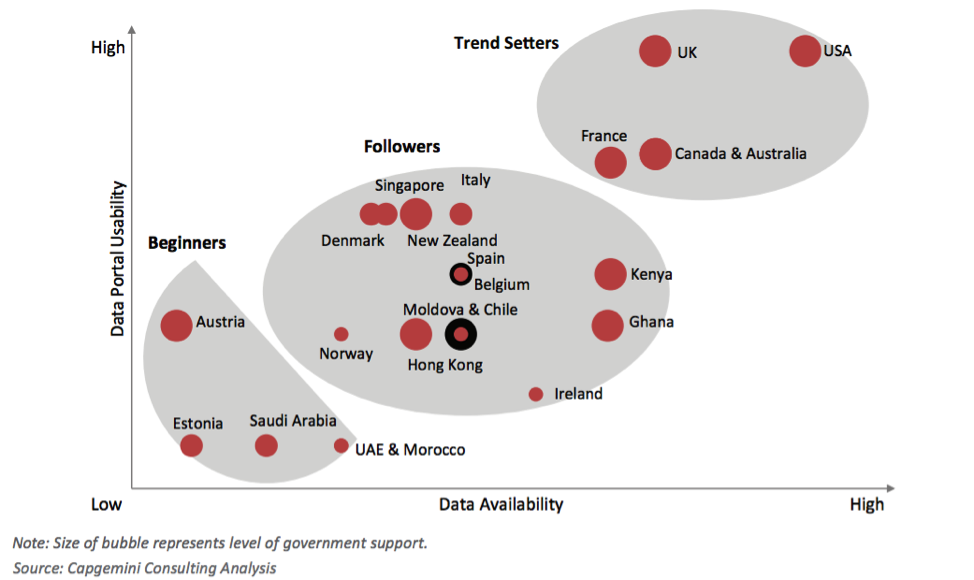How open data portals can spur economic growth and innovation

Government bodies not only hide a huge amount of information, but also create a huge amount of data. Actually, they are one of the largest data sources in the world, the source materials that they have can cost a lot of money. According to McKinsey’s 2011 forecast , by 2020 the potential value of Big Data for the European sector could increase to two hundred and fifty billion euros per year. Most of this data is created for budget funds, therefore, it would be logical to provide them for public use. This would allow people to create new innovative services that could have a significant impact on economic growth.
Many governments aim to open their data. The EU is working to create regulatory requirements for the procedure for declassifying data held at the Institutes of the European Union, and the US government has developed a data disclosure project that was launched in 2011. In addition, the Australian Government has developed an extensive strategy , the main purpose of which is to publish data belonging to national or regional authorities. With this strategy, the Australian government wants to make sure that authorities and organizations take full advantage of Big Data while ensuring confidentiality. Of course, there are many other countries, in the Open Data Economy report of Capgemini Consulting, it is explained that, regarding the issue of publishing data, countries can be divided into three different categories: beginners, followers, and set the trend. Twenty-three countries were analyzed, and it is now known that 22% of countries shared data that can be defined as complex data containing information of high value, but too detailed in nature, as well as including a large number of data sets of disparate topics. that there is still a lot of work to do.
')

The size of the circle shows the level of state support
One of the promising areas of activity that emerged due to the fact that governments are notifying the public about the fact of the publication of data is the rise in data trading or in the information markets. A large number of new companies create trading platforms where not only public information is available, but where users also have the opportunity to easily combine it with all kinds of other (freely available) databases for developing original ideas and exploring new perspectives that open when different sets interact. data. Such data markets are becoming increasingly important, and, fortunately, are developing quite rapidly, judging by the list , which includes 17 different data markets.
Information can be published, sold, bought, distributed or be available for free download through portals that offer great opportunities for countries, companies and young firms around the world. Neelie Kroes , vice president of the European Commission, believes that declassifying data can double their cost to about seventy million euros. In consequence, such portals can be used to create applications that can help improve society, solve problems of the economy and contribute to its growth.
There are many benefits for both the state and entrepreneurs. According to a Capgemini report, using open data portals, you can manage revenues, reduce costs, increase efficiency, and create jobs for future generations. A state, for example, can increase tax revenues while providing increased economic activity or make money by selling accumulated information of high value at an inflated cost. Although, of course, it can be argued that the raw material, when published, should be sold for free or at cost, and the pre-processed data can be sold with a premium. From the report: “In countries where organizations have minimized / zero pricing models for service charges, the number of new users has increased and ranges from 1,000% to 10,000%, which leads to higher revenues . ”
If different data sets interact with each other, as well as related to private / corporate information, this may lead the company to increase efficiency, the emergence of new ideas and more rational decision-making, because she will have more prospects on the market. Finally, the interest arouses in a crisis provides a revival of entrepreneurial activity, which, in turn, leads to an increase in the number of jobs and the need for more qualified employees (which entails the introduction of new, including distance learning courses). universities).
There are many examples in the world of how information from open data portals helped find original solutions for many different problems. The OpenData500 website has made a long list of startups working with Big Data and using open source materials to build and develop their companies. In addition, several projects from the Open Data Institute (United Kingdom) also joined the program. Let's look at three of them:
- BillGuard analyzes the available litigation data related to billing issues in order to identify financial fraud.
- Placr is creating a single information resource for developers about public transport, including a timetable, sending vehicles in real time, and other crucial information collected from open data resources.
- Owler is a mobile online resource that provides competitive intelligence reports, thereby helping the user to follow and monitor companies, as well as receive full information about them.
There are many more companies working hard to learn how to use Big Data to create similar projects and solutions. Of course, this will become possible only when they have access to information, and this, in turn, reflects the potential of opening databases and creating open data portals. Fortunately, some governments, among other things, create variations on the theme of such projects, by materially supporting the most innovative applications based on open data. A striking example is the competition from the American Energy Data Challenge , which offers one hundred thousand dollars to the most innovative company, which will increase energy efficiency and offer clean energy technologies using publicly available information. Such incentives, combined with a large number of open data portals, will ensure the growth of innovation and the economy.
Source: https://habr.com/ru/post/221281/
All Articles